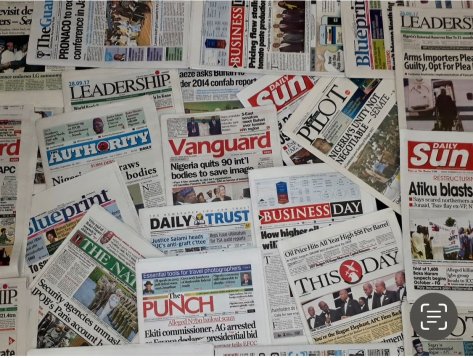The Evolution and Impact of Nigerian Newspapers

Nigerian Newspapers The Nigerian media landscape is diverse and dynamic, with newspapers playing a pivotal role in shaping public opinion, informing citizens, and contributing to the democratic process. Nigerian newspapers have undergone significant transformations from their colonial beginnings to the digital era, adapting to political, economic, and technological changes. Nigerian Newspapers This article explores the evolution, challenges, and impact of Nigerian newspapers in the country’s socio-political fabric.

A Brief History of Nigerian Newspapers
The history of Nigerian newspapers dates back to the mid-19th century, when Reverend Henry Townsend established Iwe Irohin, the first newspaper in Nigeria, in 1859. This publication, printed in Yoruba and English, served as a platform for disseminating Christian teachings and news. It also marked the beginning of journalism in Nigeria, setting the stage for the growth of the newspaper industry.
The early 20th century saw the rise of several other newspapers, such as the Daily Times, established in 1926, and The West African Pilot, founded in 1937 by Nnamdi Azikiwe, a prominent nationalist and later Nigeria’s first president. These publications played a crucial role in advocating for Nigeria’s independence, challenging colonial rule, and promoting nationalist ideologies.
The Role of Newspapers in Post-Independence Nigeria

Following Nigeria’s independence in 1960, newspapers continued to be a powerful force in the country’s socio-political landscape. They became platforms for political discourse, exposed corruption, and held leaders accountable. Newspapers such as the Nigerian Tribune, founded by Chief Obafemi Awolowo in 1949, and The Guardian, established in 1983, emerged as leading voices advocating for democracy, human rights, and good governance.
During periods of military rule, Nigerian newspapers faced severe censorship, harassment, and persecution. The military regimes of the 1980s and 1990s were particularly harsh on the press, with several journalists arrested, publications shut down, and media houses raided. Despite these challenges, the press remained resilient, reporting on issues affecting the nation and fighting to restore democratic rule.
The Digital Revolution and the Transformation of Nigerian Newspapers
The advent of the Internet and digital technology in the early 2000s brought significant changes to the newspaper industry in Nigeria. Traditional print newspapers had to adapt to the new digital environment, with many launching online editions to reach a broader audience. Newspapers such as The Punch, ThisDay, and Vanguard established strong online presences, offering news in real time and engaging readers through social media platforms.
The digital revolution also gave rise to online-only news platforms like Sahara Reporters and Premium Times, which have become influential in investigative journalism and reporting on corruption and human rights abuses. These platforms have challenged traditional newspapers by providing alternative narratives and breaking stories that mainstream media might overlook or suppress.
The Role of Newspapers in Promoting Democracy and Accountability
Nigerian newspapers have played a crucial role in promoting democracy and accountability. Investigative journalism by publications such as Premium Times, The Guardian, and The Punch has exposed numerous cases of corruption, human rights violations, and abuse of power by government officials. These reports have led to public outcry, judicial inquiries, and, in some cases, the prosecution of those involved.
During election periods, newspapers are instrumental in educating the public about the electoral process, providing platforms for political debate, and reporting on electoral malpractices. Their role in election coverage ensures transparency and credibility in the democratic process.
Challenges Facing Nigerian Newspapers
Despite their importance, Nigerian newspapers face several challenges that impact their operations and sustainability. Some of the key challenges include:
- Economic Constraints
The economic environment in Nigeria poses significant challenges for the newspaper industry. High production costs, fluctuating exchange rates, and limited advertising revenue make it difficult for newspapers to operate profitably. Many newspapers struggle to pay staff salaries and maintain regular publication schedules.
- Declining Readership and Revenue
With the proliferation of digital media and social networks, traditional newspapers have seen a decline in readership and revenue. Younger audiences prefer consuming news through digital platforms, leading to reduced circulation and advertising revenue for print newspapers. This shift has forced many newspapers to reconsider their business models and invest in digital transformation.
- Censorship and Political Pressure
Although Nigeria is a democratic nation, the press still faces censorship and political pressure, mainly when reporting on sensitive issues such as corruption, human rights abuses, and security. Journalists and media houses have been subjected to intimidation, harassment, and legal actions aimed at silencing critical voices.
- Fake News and Misinformation
The rise of social media has also led to the spread of fake news and misinformation, which undermines the credibility of legitimate news sources. Nigerian newspapers constantly battle to verify and debunk false information while maintaining journalistic integrity and trust.
The Future of Nigerian Newspapers
The future of Nigerian newspapers lies in their ability to adapt to the changing media landscape. Digital transformation is no longer optional but necessary for survival. Newspapers must invest in digital platforms, enhance their online presence, and explore new revenue models such as subscription services, sponsored content, and digital advertising.
Collaboration with international media organizations can also help Nigerian newspapers build capacity in investigative journalism, fact-checking, and data journalism. This will enable them to produce high-quality, impactful stories that resonate with local and global audiences.
Moreover, fostering a culture of press freedom and protecting journalists from harassment and persecution are essential for the sustainability of the newspaper industry in Nigeria. Legal reforms that safeguard media freedom and promote transparency and accountability in government are crucial for creating an enabling environment for the press to thrive.
Conclusion
Nigerian newspapers have a rich history and have played an indispensable role in shaping the country’s socio-political landscape. From advocating for independence to promoting democracy and holding leaders accountable, they have been a voice for the people. Despite their challenges, Nigerian newspapers remain a vital part of the nation’s democratic process.
As the media landscape evolves, the resilience, innovation, and commitment of Nigerian newspapers will determine their relevance and impact in the years to come. Embracing digital transformation, upholding journalistic integrity, and advocating for press freedom are vital to ensuring that Nigerian newspapers remain a cornerstone of democracy and a reliable source of information for the Nigerian people.





